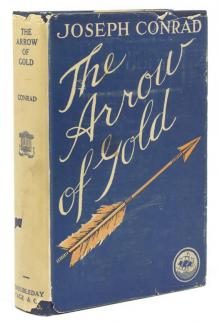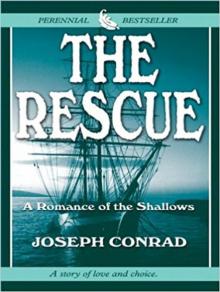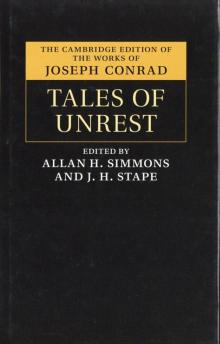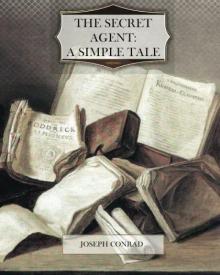- Home
- Joseph Conrad
The Brute
The Brute Read online
* * *
The Brute
Joseph Conrad
This page copyright © 2002 Blackmask Online.
http://www.blackmask.com
Dodging in from the rain-swept street, I exchanged a smile and a glance with Miss Blank in the bar of the Three Crows. This exchange was effected with extreme propriety. It is a shock to think that, if still alive, Miss Blank must be something over sixty now. How time passes!
Noticing my gaze directed enquiringly at the partition of glass and varnished wood, Miss Blank was good enough to say, encouragingly:
"Only Mr. Jermyn and Mr. Stonor in the parlour, with another gentleman I've never seen before."
I moved towards the parlour door. A voice discoursing on the other side (it was but a matchboard partition) rose so loudly that the concluding words became quite plain in all their atrocity:
'That fellow Wilmot fairly dashed her brains out, and a good job too!"
This inhuman sentiment, since there was nothing profane or improper in it, failed to do as much as to check the slight yawn Miss Blank was achieving behind her hand. And she remained gazing fixedly at the window-panes, which streamed with rain.
As I opened the parlour door the same voice went on in the same cruel strain:
"I was glad when I heard she got the knock from somebody at last. Sorry enough for poor Wilmot, though. That man and I used to be chums at one time. Of course that was the end of him. A clear case if there ever was one. No way out of it. None at all."
The voice belonged to the gentleman Miss Blank had never seen before. He straddled his long legs on the hearthrug. Jermyn, leaning forward, held his pocket-handkerchief spread out before the grate. He looked back dismally over his shoulder, and as I slipped behind one of the little wooden tables, I nodded to him. On the other side of the fire, imposingly calm and large, sat Mr.
Stonor, jammed tight into a capacious Windsor armchair. There was nothing small about him but his short, white side-whiskers. Yards and yards of extra superfine blue cloth (made up into an overcoat) reposed on a chair by his side. And he must just have brought some liner from sea, because another chair was smothered under his black waterproof, ample as a pall, and made of three-fold oiled silk, double-stitched throughout. A man's handbag of the usual size looked like a child's toy on the floor near his feet.
I did not nod to him. He was too big to be nodded to in that parlour. He was a senior Trinity pilot and condescended to take his turn in the cutter only during the summer months. He had been many times in charge of royal yachts in and out of Port Victoria. Besides, it's no use nodding to a monument. And he was like one. He didn't speak, he didn't budge. He just sat there, holding his handsome old head up, immovable, and almost bigger than life. It was extremely fine. Mr. Stonor's presence reduced old Jermyn to a mere shabby wisp of a man, and made the talkative stranger in tweeds on the hearthrug look absurdly boyish. The latter must have been a few years over thirty, and was certainly not the sort of individual that gets abashed at the sound of his own voice, because gathering me in, as it were, by a friendly glance, he kept it going without a check:
"I was glad of it," he repeated emphatically. "You may be surprised at it, but then you haven't gone through the experience I've had of her. I can tell you, it was something to remember. Of course, I got off scott free myself—as you can see. She did her best to break up my pluck for me tho'. She jolly near drove as fine a fellow as ever lived into a madhouse. What do you say to that—eh?"
Not an eyelid twitched in Mr. Stonor's enormous face. Monumental! The speaker looked straight into my eyes.
"It used to make me sick to think of her going about the world murdering people."
Jermyn approached the handkerchief a little nearer to the grate and groaned. It was simply a habit he had.
"I've seen her once," he declared, with mournful indifference. "She had a house—"
The stranger in tweeds turned to stare down at him surprised.
"She had three houses," he corrected authoritatively. But Jermyn was not to be contradicted.
"She had a house, I say," he repeated, with dismal obstinacy. "A great big, ugly, white thing.
You could see it from miles away—sticking up."
"So you could," assented the other readily. "It was old Colchester's notion, though he was always threatening to give her up. He couldn't stand her racket any more, he declared; it was too much of a good thing for him; he would wash his hands of her, if he never got hold of another—
and so on. I daresay he would have chucked her, only—it may surprise you—his missus wouldn't hear of it. Funny, eh? But with women, you never know how they will take a thing, and Mrs. Colchester, with her moustaches and big eyebrows, set up for being as strong-minded as they make them. She used to walk about in a brown silk dress, with a great gold cable flopping about her bosom. You should have heard her snapping out: 'Rubbish!' or 'Stuff and nonsense!' I daresay she knew when she was well off. They had no children, and had never set up a home anywhere. When in England she just made shift to hang out anyhow in some cheap hotel or boarding-house. I daresay she liked to get back to the comforts she was used to. She knew very well she couldn't gain by any change. And, moreover, Colchester, though a first-rate man, was not what you may call in his first youth, and, perhaps, she may have thought that he wouldn't be able to get hold of another (as he used to say) so easily. Anyhow, for one reason or another, it was 'Rubbish' and 'Stuff and nonsense' for the good lady. I overheard once young Mr. Apse himself say to her confidentially: 'I assure you, Mrs. Colchester, I am beginning to feel quite unhappy about the name she's getting for herself.' 'Oh,' says she, with her deep little hoarse laugh, 'if one took notice of all the silly talk,' and she showed Apse all her ugly false teeth at once. 'It would take more than that to make me lose my confidence in her, I assure you,' says she."
At this point, without any change of facial expression, Mr. Stonor emitted a short sardonic laugh. It was very impressive, but I didn't see the fun. I looked from one to another. The stranger on the hearthrug had an ugly smile.
"And Mr. Apse shook both Mrs. Colchester's hands, he was so pleased to hear a good word said for their favourite. All these Apses, young and old you know, were perfectly infatuated with that abominable, dangerous—"
"I beg your pardon," I interrupted, for he seemed to be addressing himsell exclusively to me, "but who on earth are you talking about?"
"I am talking of the Apse family," he answered, courteously.
I nearly let out a damn at this. But just then the respected Miss Blank put her head in, and said that the cab was at the door, if Mr. Stonor wanted to catch the eleven-three up.
At once the senior pilot arose in his mighty bulk and began to struggle into his coat, with awe-inspiring upheavals. The stranger and I hurried impulsively to his assistance, and directly we laid our hands on him he became perfectly quiescent. We had to raise our arms very high, and to make efforts. It was like caparisoning a docile elephant. With a "Thanks, gentlemen," he dived under and squeezed himself through the door in a great hurry.
We smiled at each other in a friendly way.
"I wonder how he manages to hoist himself up a ship's side-ladder," said the man in tweeds; and poor Jermyn, who was a mere North Sea pilot, without official status or recognition of any sort, pilot only by courtesy, groaned.
"He makes eight hundred a year."
"Are you a sailor?" I asked the stranger, who had gone back to his position on the rug.
"I used to be till a couple of years ago when I got married," answered this communicative individual. "I even went to sea first in that very ship we were speaking of when you came in."
"What ship?" I asked, puzzled. "I never heard you mention a ship."
"I've just told you h
er name, my dear sir," he replied. "The Apse Family. Surely you've heard of the great firm of Apse Sons, shipowners. They had a pretty big fleet. There was the Lucy Apse, and the Harold Apse, and Anne, John, Malcolm, Clara, Juliet, and so on—no end of Apses. Every brother, sister, aunt, cousin, wife—and grandmother too, for all I know—of the firm had a ship named after them. Good, solid, old-fashioned craft they were too, built to carry and to last. None of your new-fangled, labour-saving appliances in them, but plenty of men and plenty of good salt beef and hard tack put aboard—and off you go to fight your way out and home again."
The miserable Jermyn made a sound of approval, which sounded like a groan of pain. Those were the ships for him. He pointed out in doleful tones that you couldn't say to labour-saving appliances: "Jump lively now, my hearties." No labour-saving appliance would go aloft on a dirty night with the sands under your lee.
"No," assented the stranger, with a wink at me. "The Apses didn't believe in them either, apparently. They treated their people well—as people don't get treated nowadays, and they were awfully proud of their ships. Nothing ever happened to them. This last one, the Apse Family, was to be like the others, only she was to be still stronger, still safer, still more roomy and comfortable. I believe they meant her to last for ever. They had her built composite—iron, teak-wood, and greenheart, and her scantling was something fabulous. If ever an order was given for a ship in a spirit of pride this one was. Everything of the best. The commodore captain of the employ was to command her, and they planned the accommodation for him like a house on shore under a big, tall poop that went nearly to the mainmast. No wonder Mrs. Colchester wouldn't let the old man give her up. Why, it was the best home she ever had in all her married days. She had a nerve, that woman.
"The fuss that was made while that ship was building! Let's have this a little stronger, and that a little heavier; and hadn't that other thing better be changed for something a little thicker. The builders entered into the spirit of the game, and there she was, growing into the clumsiest, heaviest ship of her size right before all their eyes, without anybody becoming aware of it somehow. She was to be 2,000 tons register, or a little over no less on any account. But see what happens. When they came to measure her she turned out 1,999 tons and a fraction. General consternation! And they say old Mr. Apse was so annoyed, when they told him, that he took to his bed and died. The old gentleman had retired from the firm twenty-five years before, and was ninety-six years old if a day, so his death wasn't, perhaps, so surprising. Still Mr. Lucian Apse was convinced that his father would have lived to a hundred. So we may put him at the head of the list. Next comes the poor devil of a shipwright that brute caught and squashed as she went off the ways. They called it the launch of a ship, but I've heard people say that, from the wailing and yelling and scrambling out of the way, it was more like letting a devil loose upon the river. She snapped all her checks like pack-threads, and went for the tugs in attendance like a fury. Before anybody could see what she was up to she sent one of them to the bottom, and laid up another for three months' repairs. One of her cables parted, and then, suddenly—you couldn't tell why—she let herself be brought up with the other as quiet as a lamb.
"That's how she was. You could never be sure what she would be up to next. There are ships difficult to handle, but generally you can depend on them behaving rationally. With that ship, whatever you did with her, you never knew how it would end. She was a wicked beast. Or, perhaps, she was only just insane."
He uttered this supposition in so earnest a tone that I could not refrain from smiling. He left off biting his lower lip to apostrophize me.
"Eh! Why not? Why couldn't there be something in her build, in her lines corresponding to—
What's madness? Only something just a tiny bit wrong in the make of your brain. Why shouldn't there be a mad ship—I mean mad in a ship-like way, so that under no circumstances could you be sure she would do what any other sensible ship would naturally do for you. There are ships that steer wildly, and ships that can't be quite trusted always to stay; others want careful watching when running in a gale; and, again, there may be a ship that will make heavy weather of it in every little blow. But then you expect her to be always so. You take it as part of her character, as a ship, just as you take account of a man's peculiarities of temper when you deal with him. But with her you couldn't. She was unaccountable. If she wasn't mad, then she was the most evil-minded, underhand, savage brute that ever went afloat. I've seen her run in a heavy gale beautifully for two days, and on the third broach to twice in the same afternoon. The first time she flung the helmsman clean over the wheel, but as she didn't quite manage to kill him she had another try about three hours afterwards. She swamped herself fore and aft, burst all the canvas we had set, scared all hands into a panic, and even frightened Mrs. Colchester down there in these beautiful stern cabins that she was so proud of. When we mustered the crew there was one man missing. Swept overboard, of course, without being either seen or heard, poor devil!
and I only wonder more of us didn't go.
"Always something like that. Always. I heard an old mate tell Captain Colchester once that it had come to this with him, that he was afraid to open his mouth to give any sort of order. She was as much of a terror in harbour as at sea. You could never be certain what would hold her. On the slightest provocation she would start snapping ropes, cables, wire hawsers, like carrots. She was heavy, clumsy, unhandy—but that does not quite explain that power for mischief she had.
You know, somehow, when I think of her I can't help remembering what we hear of incurable lunatics breaking loose now and then."
He looked at me inquisitively. But, of course, I couldn't admit that a ship could be mad.
"In the ports where she was known," he went on, "they dreaded the sight of her. She thought nothing of knocking away twenty feet or so of solid stone facing off a quay or wiping off the end of a wooden wharf. She must have lost miles of chain and hundreds of tons of anchors in her time. When she fell aboard some poor offending ship it was the very devil of a job to haul her off again. And she never got hurt herself—just a few scratches or so, perhaps. They had wanted to have her strong. And so she was. Strong enough to ram Polar ice with. And as she began so she went on. From the day she was launched she never let a year pass without murdering somebody.
I think the owners got very worried about it. But they were a stiff-necked generation all these Apses; they wouldn't admit there could be anything wrong with the Apse Family. They wouldn't even change her name. 'Stuff and nonsense,' as Mrs. Colchester used to say. They ought at least to have shut her up for life in some dry dock or other, away up the river, and never let her smell salt water again. I assure you, my dear sir, that she invariably did kill some one every voyage she made. It was perfectly well known. She got a name for it, far and wide."
I expressed my surprise that a ship with such a deadly reputation could ever get a crew.
"Then, you don't know what sailors are, my dear sir. Let me just show you by an instance. One day in dock at home, while loafing on the forecastle head, I noticed two respectable salts come along, one a middle-aged, competent, steady man, evidently, the other a smart, youngish chap.
They read the name on the bows and stopped to look at her. Says the elder man: 'Apse Family.
That's the sanguinary female dog' (I'm putting it in that way) 'of a ship, Jack, that kills a man every voyage. I wouldn't sign in her—not for Joe, I wouldn't.' And the other says: 'If she were mine, I'd have her towed on the mud and set on fire, blamme if I wouldn't.' Then the first man chimes in: 'Much do they care! Men are cheap, God knows.' The younger one spat in the water alongside. 'They won't have me—not for double wages.'
"They hung about for some time and then walked up the dock. Half an hour later I saw them both on our deck looking about for the mate, and apparently very anxious to be taken on. And they were."
"How do you account for this?" I asked.
"What would you s
ay?" he retorted. "Recklessness! The vanity of boasting in the evening to all their chums: 'We've just shipped in that there Apse Family. Blow her. She ain't going to scare us.' Sheer sailor-like perversity! A sort of curiosity. Well—a little of all that, no doubt. I put the question to them in the course of the voyage. The answer of the elderly chap was:
" 'A man can die but once.' The younger assured me in a mocking tone that he wanted to see 'how she would do it this time.' But I tell you what; there was a sort of fascination about the brute."
Jermyn, who seemed to have seen every ship in the world, broke in sulkily:
"I saw her once out of this very window towing up the river; a great black ugly thing, going along like a big hearse."
"Something sinister about her looks, wasn't there?" said the man in tweeds, looking down at old Jermyn with a friendly eye. "I always had a sort of horror of her. She gave me a beastly shock when I was no more than fourteen, the very first day—nay, hour—I joined her. Father came up to see me off, and was to go down to Gravesend with us. I was his second boy to go to sea. My big brother was already an officer then. We got on board about eleven in the morning, and found the ship ready to drop out of the basin, stem first. She had not moved three times her own length when, at a little pluck the tug gave her to enter the dock gates, she made one of her rampaging starts, and put such a weight on the check rope-a new six-inch hawser—that forward there they had no chance to ease it round in time, and it parted. I saw the broken end fly up high in the air, and the next moment that brute brought her quarter against the pier-head with a jar that staggered everybody about her decks. She didn't hurt herself. Not she! But one of the boys the mate had sent aloft on the mizzen to do something, came down on the poop-deck—thump-right in front of me. He was not much older than myself. We had been grinning at each other only a few minutes before. He must have been handling himself carelessly, not expecting to get such a jerk. I heard his startled cry—Oh!—in a high treble as he felt himself going, and looked up in time to see him go limp all over as he fell. Ough! Poor father was remarkably white about the gills when we shook hands in Gravesend. 'Are you all right?' he says, looking hard at me. 'Yes, father.' 'Quite sure?' 'Yes, father.' 'Well, then, good-bye, my boy.' He told me afterwards that for half a word he would have carried me off home with him there and then. I am the baby of the family—you know," added the man in tweeds, stroking his moustache with an ingenuous smile.

 Heart of Darkness
Heart of Darkness Lord Jim
Lord Jim The Nigger of the Narcissus (Echo Library)
The Nigger of the Narcissus (Echo Library) Victory (Dover Thrift Editions)
Victory (Dover Thrift Editions) Secret Agent
Secret Agent Nostromo
Nostromo Chance: A Tale in Two Parts
Chance: A Tale in Two Parts Youth
Youth Almayer's Folly
Almayer's Folly The Heart of Darkness and the Secret Sharer
The Heart of Darkness and the Secret Sharer The Arrow of Gold: A Story Between Two Notes
The Arrow of Gold: A Story Between Two Notes The Rescue: A Romance of the Shallows
The Rescue: A Romance of the Shallows The Point Of Honor: A Military Tale
The Point Of Honor: A Military Tale Tales of Unrest
Tales of Unrest Under Western Eyes
Under Western Eyes Gaspar Ruiz
Gaspar Ruiz A Set of Six
A Set of Six Heart of Darkness and the Congo Diary (Penguin Classics)
Heart of Darkness and the Congo Diary (Penguin Classics) Heart of Darkness and Selected Short Fiction
Heart of Darkness and Selected Short Fiction Typhoon
Typhoon Youth, a Narrative
Youth, a Narrative Tomorrow
Tomorrow The Arrow of Gold
The Arrow of Gold The Shadow Line: A Confession
The Shadow Line: A Confession The Rescue
The Rescue Victory (Echo Library)
Victory (Echo Library) The Brute
The Brute Romance
Romance A Personal Record
A Personal Record Lord Jim: A Tale
Lord Jim: A Tale Heart of Darkness and Selected Short Fiction (Barnes & Noble Classics Series)
Heart of Darkness and Selected Short Fiction (Barnes & Noble Classics Series) Within the Tides
Within the Tides The Secret Sharer and Other Stories
The Secret Sharer and Other Stories Falk
Falk Heart of Darkness and The Secret Sharer
Heart of Darkness and The Secret Sharer Chance
Chance An Anarchist
An Anarchist The Secret Agent: A Simple Tale
The Secret Agent: A Simple Tale The Secret Agent
The Secret Agent Complete Works of Joseph Conrad (Illustrated)
Complete Works of Joseph Conrad (Illustrated) Heart of Darkness and the Congo Diary
Heart of Darkness and the Congo Diary Notes on Life & Letters
Notes on Life & Letters Typhoon (Single Story)
Typhoon (Single Story)